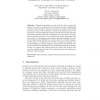Free Online Productivity Tools
i2Speak
i2Symbol
i2OCR
iTex2Img
iWeb2Print
iWeb2Shot
i2Type
iPdf2Split
iPdf2Merge
i2Bopomofo
i2Arabic
i2Style
i2Image
i2PDF
iLatex2Rtf
Sci2ools
102
click to vote
DEXA
2010
Springer
2010
Springer
Enhanced Foundry Production Control
Mechanical properties are the attributes that measure the faculty of a metal to withstand several loads and tensions. Specifically, ultimate tensile strength is the force a material can resist until it breaks and, thus, it is one of the variables to control in the foundry process. The only way to examine this feature is the use of destructive inspections that renders the casting invalid with the subsequent cost increment. Nevertheless, the foundry process can be modelled as an expert knowledge cloud upon which we may apply several machine learnings techniques that allow foreseeing the probability for a certain value of a variable to happen. In this paper, we extend previous research on foundry production control by adapting and testing support vector machines and decision trees for the prediction in beforehand of the mechanical properties of castings. Finally, we compare the obtained results and show that decision trees are more suitable than the rest of the counterparts for the predic...
Related Content
| Added | 08 Nov 2010 |
| Updated | 08 Nov 2010 |
| Type | Conference |
| Year | 2010 |
| Where | DEXA |
| Authors | Javier Nieves, Igor Santos, Yoseba K. Penya, Felix Brezo, Pablo Garcia Bringas |
Comments (0)

